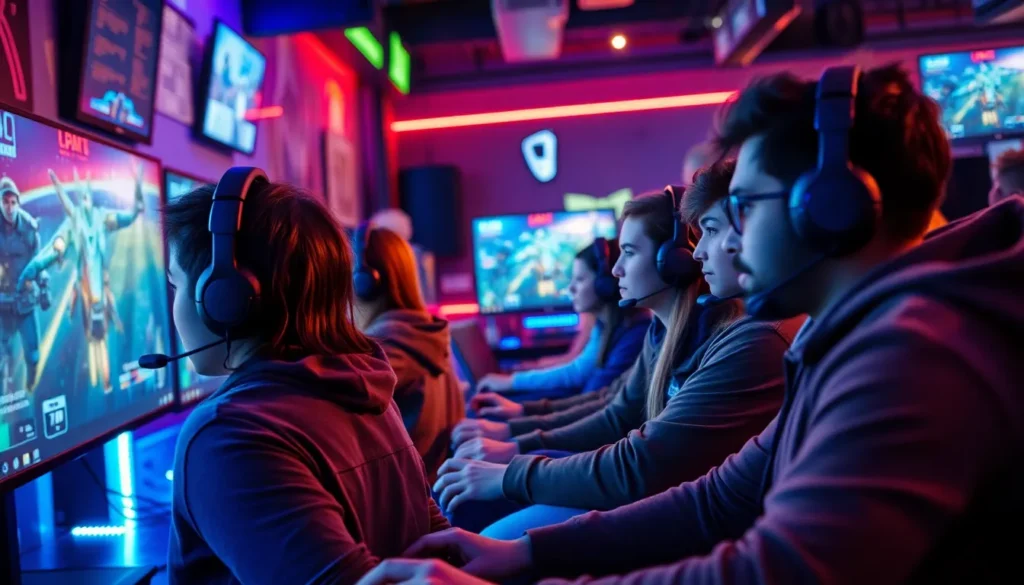In a world where players seek thrilling adventures and immersive experiences, AI in gaming is the secret sauce that takes gameplay to the next level. Imagine battling a dragon that learns your every move or teaming up with NPCs so smart they could probably win a game of chess against your grandma. It’s not just a game anymore; it’s a digital playground where the rules are rewritten by algorithms.
Table of Contents
ToggleOverview of AI in Gaming
Artificial intelligence fundamentally alters the gaming landscape. Dynamic gameplay emerges as a direct result of sophisticated algorithms and machine learning techniques. Players experience enhanced engagement when they encounter non-player characters that learn and adapt to their tactics. Intelligent NPCs challenge players with increasingly complex behaviors, making competitions feel more organic and lifelike.
Examples of AI advancements showcase significant improvements. In recent titles, enemies react to player decisions, creating a sense of unpredictability. Games like The Last of Us Part II employ AI systems to simulate realistic emotional responses in characters. Adaptable foes adjust their strategies based on player actions, contributing to tension and excitement.
AI also streamlines game development processes. Developers utilize AI for procedural generation, creating expansive worlds with minimal manual input. Results manifest in diverse environments and quests, ensuring players enjoy unique experiences with each session.
Moreover, AI enhances accessibility in gaming. Developers implement tools to assist players with disabilities, offering custom settings that personalize gameplay. Utilizing AI can lead to voice recognition and adaptive control schemes, expanding gaming access to broader demographics.
These applications illustrate how AI reshapes not only gameplay but also the development process and accessibility efforts. Gaming studios increasingly embrace AI to forge innovative paths, fostering uncharted territory in player experiences.
Benefits of AI in Gaming
AI significantly enhances player experiences and transforms how games are designed. These benefits manifest in various aspects, from gameplay dynamics to the overall development process.
Enhanced Gameplay Experience
AI improves gameplay experience through sophisticated NPC behavior. Players encounter characters that adapt to their strategies, creating intense and unpredictable challenges. For example, opponents might learn from previous encounters, adjusting their tactics to counter player moves effectively. This adaptability fosters a competitive atmosphere reminiscent of human interactions. Furthermore, personalized experiences emerge as AI analyzes player data, tailoring challenges to skill levels. Engaging narratives evolve as AI-driven dialogue systems respond dynamically, enriching storytelling. Players enjoy deeper immersion with environments that react intelligently to their actions.
Improved Game Design
Game design benefits from AI through procedural generation techniques. Developers leverage algorithms to create expansive, intricate worlds that require minimal manual effort. This automation leads to diverse environments packed with unique quests and surprises. AI tools assist in fine-tuning game balance, ensuring that challenges maintain player engagement without causing frustration. Enhanced testing processes emerge, allowing studios to identify bugs and optimize gameplay mechanics efficiently. AI also fosters collaboration among development teams, streamlining workflows and facilitating faster production timelines. With these innovations, studios create engaging titles that captivate players and usher in an era of creativity in the gaming industry.
Types of AI Used in Gaming
Artificial intelligence serves various essential functions in gaming, profoundly impacting gameplay and design.
Non-Player Characters (NPCs)
Non-player characters utilize AI to display complex behavior patterns. These NPCs interact with players in real-time, providing a more immersive experience. Through machine learning, many NPCs adapt their strategies based on player actions, creating challenging opponents. For instance, in titles like Middle-earth: Shadow of Mordor, NPCs remember player interactions, leading to dynamic storytelling and unexpected encounters. This development fosters player engagement, as the NPCs react thoughtfully rather than following scripted responses. Smart NPC behavior enhances gameplay depth, making virtual worlds feel alive.
Procedural Content Generation
Procedural content generation employs AI algorithms to generate expansive game worlds. This technique allows developers to create diverse environments with little manual effort. Games like No Man’s Sky exemplify this method, featuring billions of explorable planets generated through advanced AI systems. Developers benefit from time and cost savings, as procedural methods minimize resource requirements. Dynamic landscapes become a key player attraction, presenting unique challenges and surprises. Additionally, AI-generated content ensures no two player experiences are the same, enhancing replayability and excitement.
Challenges of Implementing AI in Gaming
Implementing AI in gaming presents unique challenges that developers must navigate to harness its full potential.
Ethical Considerations
AI introduces significant ethical questions in gaming. Developers face scrutiny over AI’s impact on player privacy. Data collection practices require transparency to ensure players understand how their information is used. In-game AI making critical decisions can lead to accountability issues regarding player outcomes. Games must also handle AI-generated content responsibly to prevent perpetuating stereotypes. The creation of AI algorithms demands ethical frameworks, promoting fairness and inclusivity in gameplay experiences.
Technical Limitations
Technical limitations can hinder AI integration in gaming. Computational power often restricts the complexity of AI models during real-time rendering. Developers encounter challenges in balancing performance and AI behavior, striving for responsiveness. Memory constraints impact the scalability of AI systems, often leading to simplified interactions. Achieving sophisticated NPC behaviors while maintaining frame rates remains a delicate balance. Developers require continuous innovation to tackle these technical obstacles, ensuring AI enhances the gaming experience without compromising performance.
Future of AI in Gaming
AI is set to revolutionize gaming even further, enhancing player interactivity and immersion. Adaptive NPCs will respond intelligently to individual player styles, creating organic challenges and engaging narratives. Developers aim to implement machine learning algorithms that can learn from each encounter, ensuring that every gaming session feels unique.
Procedural generation technology will expand, creating vast and diverse worlds with minimal effort from developers. Titles like No Man’s Sky will likely serve as benchmarks, utilizing AI to craft billions of distinctive environments. As new algorithms evolve, players will experience never-before-seen landscapes and quests tailored to their preferences.
Accessibility features are expected to increase, empowering players with disabilities. AI-driven tools like voice recognition and adaptive interfaces will create more inclusive gaming experiences, widening the player base. Developers recognize the importance of catering to diverse audiences, making gaming more enjoyable for everyone.
Ethical considerations will grow more critical, pressing developers to prioritize transparency in AI applications. As AI systems analyze and learn from player data, fostering responsibility in data usage becomes essential. Navigating these complexities ensures that game designs respect player privacy while enhancing their experiences.
AI’s integration into game testing will improve efficiency, identifying bugs and balancing gameplay more effectively. Automation will significantly decrease production timelines, enabling studios to release higher quality titles at a faster rate. As innovation continues to thrive, the gaming landscape will become richer and more nuanced.
AI’s role will undoubtedly shape the future direction of the gaming industry. As studios embrace cutting-edge technologies, players can anticipate experiences that are engaging, interactive, and unprecedented. The combination of advanced AI techniques and thoughtful design principles will redefine the potential of gaming as a medium.
Conclusion
Artificial intelligence is undeniably reshaping the gaming industry in profound ways. Its ability to create adaptive NPCs and dynamic environments enhances player engagement and immersion. As developers harness AI’s potential for procedural generation and personalized experiences, the gaming landscape continues to evolve, offering unique challenges and narratives.
The future promises even greater advancements in AI technology, aiming to make games more accessible and interactive. However, ethical considerations and technical challenges must be addressed to ensure responsible use of AI in gaming. As innovation flourishes, players can look forward to richer experiences that redefine what gaming can achieve.





